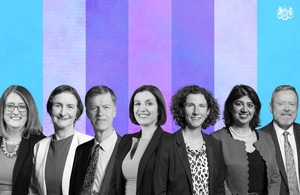Office for Equality and Opportunity to break down barriers to opportunity
People of all backgrounds will benefit from the government’s commitments to breaking down barriers, boosting opportunity and ensuring that equality is at the heart of every mission.

- Equality Hub replaced by Office for Equality and Opportunity
- Equality and opportunity to run through the government’s missions and work
- The Women and Equalities ministerial team to sit across key areas of equality
People of all backgrounds will benefit from the government’s commitments to breaking down barriers, boosting opportunity and ensuring that equality is at the heart of every mission.
The Office for Equality and Opportunity will cover the overall framework of equality legislation in the UK, including disability policy, ethnic disparities, gender equality and LGBT+ rights.
Although there is still progress to be made, the government is determined to dismantle any ceiling on people’s ambitions - ensuring women’s equality becomes a reality, tackling pay discrimination at work, and more.
Secretary of State for Education and Minister for Women and Equalities, Bridget Phillipson MP, said:
We know too many people across our country face unjust barriers, and that’s why we will ensure equality and opportunity are at the very heart of all our missions.
I am proud to stand alongside our strong Women and Equalities Ministerial team, working tirelessly to address the root causes of inequalities and socio-economic disadvantage.
Together, we will drive real, lasting change because background should never be a barrier to success.
Establishing the Office for Equality and Opportunity is just the first step as we ensure that every person has access to the opportunities that allow them to thrive.
Some of the Office for Equality and Opportunity’s key immediate priorities will be:
- strengthening the legal duty for employers to create and maintain working conditions free from harassment
- enshrining in law the full right to equal pay for ethnic minority people and disabled people
- delivering a full, trans-inclusive ban on conversion practices
- championing the rights of disabled people
- focusing on socio-economic disparities
The formation of the Office for Equality and Opportunity accompanies new appointments to the Women and Equalities ministerial team which sits across key areas of equality, such as education, social security, children and young people as well as international development.
British Sign Language (BSL) version of this press release
https://www.youtube.com/watch?v=VlP-iwKcKSU
Notes to editors:
The full Women and Equalities ministerial team is as follows:
- The Rt Hon Bridget Phillipson MP Minister for Women and Equalities
- The Rt Hon Anneliese Dodds MP Minister of State (Minister for Women and Equalities)
- The Rt Hon Sir Stephen Timms MP Minister of State (Minister for Social Security and Disability)
- Seema Malhotra MP Parliamentary Under Secretary of State (Minister for Equalities)
- Dame Nia Griffith DBE MP Parliamentary Under Secretary of State (Minister for Equalities)
- Lord Collins of Highbury Government spokesperson for Equalities
- The Rt Hon Baroness Smith of Malvern Government spokesperson for Equalities
On the Office for Equality and Opportunity:
- The Office for Equality and Opportunity in the Cabinet Office will cover the overall framework of equality legislation in the UK, including disability policy, ethnic disparities, gender equality and LGBT+ rights.
- Further details about the Office for Equality and Opportunity ministers and their portfolios are available on GOV.UK.
On the Equality (Race and Disability) Bill:
- People’s race or ethnicity should never be a barrier to opportunity.
- As set out in the King’s Speech, the Government is committed to tackling pay discrimination at work and introducing mandatory pay gap reporting for large employers on ethnicity and disability.
On the Conversion Practices Bill:
- Conversion practices are abuse. They have no place in society and must be stopped.
- The Government is committed to delivering a full, trans-inclusive ban on conversion practices, to be brought forward via a draft Conversion Practices Bill.
On the Employment Rights Bill:
- The Plan to Make Work Pay sets out a significant and ambitious agenda to ensure workplace rights are fit for a modern economy, empower working people and contribute to economic growth. This is a core part of the Government’s mission to grow the economy and raise living standards across the country.
- The Plan will support more people to stay in work, make work more family friendly and improve living standards. This will put more money in working people’s pockets to spend, boosting economic growth, resilience and conditions for innovation.
- Work is already underway to identify and deliver measures through non-legislative and secondary legislative routes.